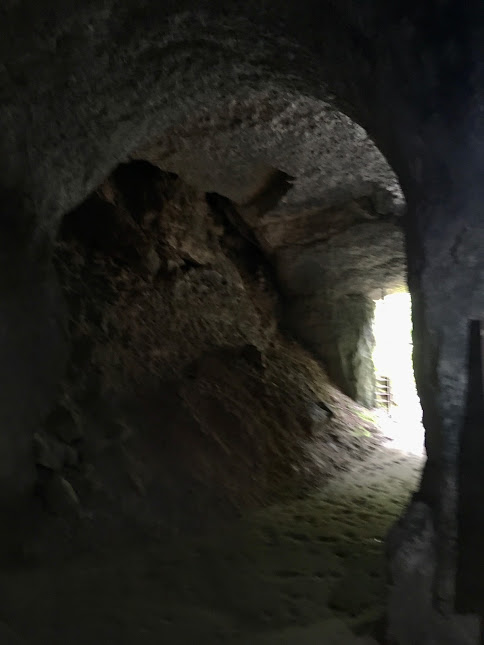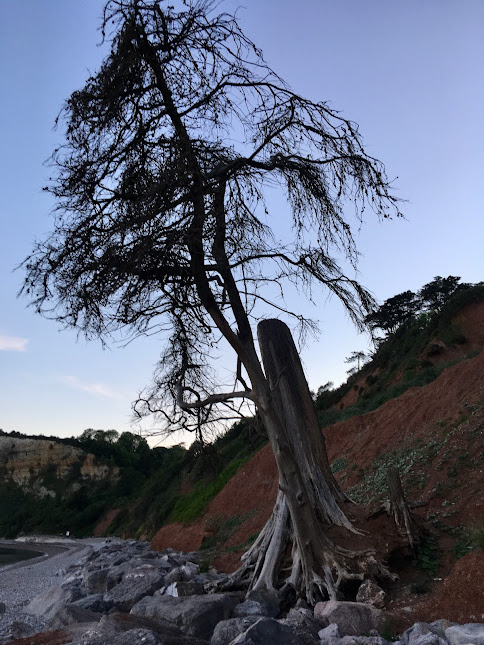This Week’s Bit of String: Miners and runaways
A hundred million years ago, according to geologists, the Southwestern region of the UK was underwater, populated by sea urchins and other such creatures. As the seas dried, the remains of those little shelled beings were compressed through extreme heat into our incredible coastal cliffs.
The same coast which Roman soldiers breached a couple thousand years ago, undoubtedly bringing with them enslaved persons from various corners of their territory. They discovered the cliffs near Beer, now a lovely seaside village in Devon, and began to quarry the stone, building arches underground to access it.
From Roman times to the 1500s, the method of extracting Beer’s pale, chalky limestone didn’t evolve much. Workers picked clear the top of a chamber, a crawlspace about 3 feet high, then climbed in and, in the cold darkness for up to 14 hours daily six days per week, they picked downward to carve blocks, 4 tonnes at a time.
When the Church ran the quarry, in the Middle Ages, they even forced miners to buy their own candles. And if a block had flint or a crack in it, the miner didn’t get paid for that day.

These blocks, made of ancient crumbled seashells and dug out by men in harshest conditions, have been used in more than half of Britain’s cathedrals, and around the world.
I learned about Beer’s miners on a quarry tour last weekend. I wondered, how on earth could people keep living with such a laborious, unrewarding existence?
One answer, apparently, is that the miners drank lots of rough cider. And probably they were pretty friendly with each other even while deafening one another from the echo of their picks. Maybe they had nice families waiting for them at home.
But they must also have been picturing themselves somewhere else. It’s hard to imagine a life without imagining, isn’t it?
Of course, we are lucky now to access books, travel, music, and things that clue us in to alternative existences. Before all those, there still would have been storytelling and songs, there would have been starry skies and vast seas and the people who sail them. Even medieval people might have had something to distract them as they worked. Did they know about the Romans before them, and imagine proving themselves in a gladiatorial ring, marching into a hot ancient city to a hero’s welcome?
Descents of Fancy
The day after visiting Beer and its caves, we went toward Lyme Regis and looked for fossils. There’s a whole beach where the Jurassic layer has shifted from under the cliffs, creating the “Ammonite Pavement.” Vast slabs with prehistoric squid shells perfectly visible.
I used a short thin stone to pry loose part of a clay underlayer, with lots of little scallopy fossils. As I pounded the edges of my chosen rock, I imagined I was a miner with my pickaxe, providing cathedral material.

Do other creative people sometimes imagine a tougher existence rather than a rosier one? It’s like when I was little and my sister and I pretended we were running away from a Dickensian workhouse or a slave plantation every time we packed for an overnight at Grandma’s.
By picturing ourselves in those situations, we weren’t trying to claim the suffering others went through, or minimise it. Maybe we were a little callous to inject this sort of peril to make our lives more exciting. But also, I think that spending mental time in such stories helped make us more empathetic as we grew up. Possibly, hopefully, it makes us a little less dramatic about the trials we have in our own lives.
When I chisel a fossil free, I’m just taking it home so I can glance at it occasionally, and smile remembering a sunny little adventure. It’s not going to form the grand arch of a cathedral or the dungeon stairs in the Tower of London. Those Beer miners, for all their struggles, at least were part of something great and I’m so glad their contributions are now recognised, in the Quarry tour and in our imaginations.
Building Great Things
When I think about people like those miners, or when I stand in a Remembrance Service and listen to the names read out of terrified young soldiers who died in battle, I concentrate really hard on who they might have been as humans. This is probably silly, even delusional, but I hope the waves of my empathy somehow make it back to those people. So that, for an instant, they sense they’re not forgotten.

Obviously it’s not enough to just imagine what people’s lives were like in the past; there are people struggling now and we need to donate, amplify, and vote in ways which benefit them. I think imagining is a strong motivator though.
Our ability to imagine, and then to empathise, may set us apart as a species (although, have you ever watched a cat slink around outside? I think our feline friends have some extremely melodramatic fantasies…) but at our core we are self-interested. In order to care about someone else’s plight, it helps to picture ourselves in their stead.
In the aftermath of 2001’s terrorist attacks in New York City and Washington, D.C. John Lennon’s song “Imagine” was banned from radio stations. Because if people are using their imaginations, that might not be so good for the weapons industry’s profits.
Of course, running alternate scenarios in our heads also just makes things more interesting. When I have to sit quietly with my students in their exams, I can pretend I’m actually in the Great Hall at Hogwarts taking O.W.L.S. tests. If stress is keeping me awake at night, I play a comforting memory of my Grammy’s voice. And I probably won’t use the miners of Beer in a story, because their reality feels so extreme I don’t think I could do it justice. But it’s inspiring to contemplate the many layers of history that have unfolded on the very earth beneath our feet.
What daydreams have you embarked on lately?